- Home
- Jack London
The Heathen
The Heathen Read online
THE HEATHEN
By JACK LONDON
Author of "The Call of the Wild," "Martin Eden," etc.
Illustrations by Anton Fischer
I MET him first in a hurricane. And though we had been through the hurricane on the same schooner, it was not until the schooner had gone to pieces under us that I first laid eyes on him. Without doubt I had seen him with the rest of the Kanaka crew on board, but I had not consciously been aware of his existence, for the Petite Jeanne was rather overcrowded. In addition to her eight or ten Kanaka sea men, her white captain, mate, and supercargo, and her six cabin passengers, she sailed from Rangiroa with something like eighty-five deck passengers--Paumotuans and Tahitians, men, women, and children, each with a trade-box, to say nothing of sleeping-mats, blankets, and clothes-bundles.
The pearling season in the Paumotus was over, and all hands were returning to Tahiti. The six of us cabin passengers were pearl- buyers. Two were Americans, one was Ah Choon, the whitest Chinese I have ever known, one was a German, one was a Polish Jew, and I completed the half-dozen. It had been a prosperous season. Not one of us had cause for complaint, nor one of the eighty-five deck passengers either. All had done well, and all were looking forward to a rest-off and a good time in Papeete. Of course the Petite Jeanne was overloaded. he was only seventy tons, and she had no right to carry a tithe of the mob she had on board. Beneath her hatches she was crammed and jammed with pearl shell and copra. Even the trade-room was packed full of shell. It was a miracle that the sailors could work her. There was no moving about the decks. They simply climbed back and forth along the rails. In the night-time they walked upon the sleepers, who carpeted the deck, two deep, I'll swear. Oh, and there were pigs and chickens on deck, and sacks of yams, while every conceivable place was festooned with strings of drinking cocoanuts and bunches of bananas. On both sides, between the fore and main shrouds, guys had been stretched, just low enough for the fore-boom to swing clear; and from each of these guys at least fifty bunches of bananas were suspended.
It promised to be a messy passage, even if we did make it in the two or three days that would have been required if the southeast trades had been blowing fresh. But they weren't blowing fresh. After the first five hours, the trade died away in a dozen gasping fans. The calm continued all that night and the next day--one of those glaring, glossy calms when the very thought of opening one's eyes to look at it is sufficient to cause a headache. The second day a man died, an Easter Islander, one of the best divers that season in the lagoon. Smallpox, that is what it was, though how smallpox could come on board when there had been no known cases ashore when we left Rangiroa is beyond me. There it was, though, smallpox, a man dead, and three others down on their backs. There was nothing to be done. We could not segregate the sick, nor could we care for them. We were packed like sardines. There was nothing to do but die--that is, there was nothing to do after the night that followed the first death. On that night, the mate, the supercargo, the Polish Jew, and four native divers sneaked away in the large whaleboat. They were never heard of again. In the morning the captain promptly scuttled the remaining boats, and there we were.
That day there were two deaths; the following day three; then it jumped to eight. It was curious to see how we took it. The natives, for instance, fell into a condition of dumb, stolid fear. The captain--Oudouse, his name was, a Frenchman--became very nervous and voluble. The German, the two Americans, and myself bought up all the Scotch whisky and proceeded to drink. The theory was beautiful--namely, if we kept ourselves soaked in alcohol, every smallpox germ that came into contact with us would immediately be scorched to a cinder. And the theory worked, though I must confess that neither Captain Oudouse nor Ah Choon was attacked by the disease either. The Frenchman did not drink at all, while Ah Choon restricted himself to one drink daily.
We had a week of it, and then the whisky gave out. It was just as well, or I shouldn't be alive now. It took a sober man to pull through what followed, as you will agree when I mention the little fact that only two men did pull through. The other man was the Heathen--at least that was what I heard Captain Oudouse call him at the moment I first became aware of the Heathen's existence.
But to come back. It was at the end of the week that I happened to glance at the barometer that hung in the cabin companion-way. Its normal register in the Paumotus was 29.90, and it was quite customary to see it vacillate between 29.85 and 30.00, or even 30.05; but to see it, as I saw it, down to 29.62, was sufficient to chill the blood of any pearl-buyer in Oceania.
I called Captain Oudouse's attention to it, only to be informed that he had watched it going down for several hours. There was little to do, but that little he did very well, considering the circumstances. He took off the light sails, shortened right down to storm canvas, spread life-lines, and waited for the wind. His mistake lay in what he did after the wind came. He hove to on the port tack, which was the right thing to do south of the Equator, if--and there was the rub--if one were not in the direct path of the hurricane. We were in the direct path. I could see that by the steady increase of the wind and the equally steady fall of the barometer. I wanted to turn and run with the wind on the port quarter until the barometer ceased falling, and then to heave to. We argued till he was reduced to hysteria, but budge he would not. The worst of it was that I could not get the rest of the pearl-buyers to back me up. Who was I, anyway, to know more about the sea and its ways than a properly qualified captain?
Of course, the sea rose with the wind, frightfully, and I shall never forget the first three seas the Petite Jeanne shipped. She had fallen off, as vessels do when hove to, and the first sea made a clean breach. The lifelines were only for the strong and well, and little good were they even for these when the women and children, the bananas and cocoanuts, the pigs and trade-boxes, the sick and the dying, were swept along in a solid, screeching, groaning mass.
The second sea filled the Petite Jeanne's decks flush with the rails, and, as her stern sank down and her bow tossed skyward, all the miserable dunnage of life and luggage poured aft. It was a human torrent. They came head-first, feet-first, sidewise, rolling over and over, twisting, squirming, writhing, and crumpling up. Now and again one or another caught a grip on a stanchion or a rope, but the weight of the bodies behind tore such grips loose. I saw what was coming, sprang on top the cabin, and from there into the mainsail itself. Ah Choon and one of the Americans tried to follow me, but I was one jump ahead of them. The American was swept away and over the stern like a piece of chaff. Ah Choon caught a spoke of the wheel and swung in behind it. But a strapping Rarotonga vahine[1]--she must have weighed two hundred and fifty--brought up against him and got an arm around his neck. He clutched the Kanaka steersman with his other hand. And just at that moment the schooner flung down to starboard. The rush of bodies and the sea that was coming along the port runway between the cabin and the rail, turned abruptly and poured to starboard. Away they went, vahine, Ah Choon, and steersman; and I swear I saw Ah Choon grin at me with philosophic resignation as he cleared the rail and went under.
The third sea--the biggest of the three--did not do so much damage. By the time it arrived, nearly everybody was in the rigging. On deck perhaps a dozen gasping, half-drowned, and half-stunned wretches were rolling about or attempting to crawl into safety. They went by the board, as did the wreckage of the two remaining boats. The other pearl-buyers and myself, between seas, managed to get about fifteen women and children into the cabin and battened down. Little good it did the poor creatures in the end.
Wind? Out of all my experiences I could not have believed it possible for the wind to blow as it did. There is no describing it. How can one describe a nightmare? It was the same way with that wind. It tore the clothes off our bodies. I say tore t
hem off, and I mean it. I am not asking you to believe it. I am merely telling something that I saw and felt. There are times when I do not believe it myself. I went through it, and that is enough. One could not face that wind and live. It was a monstrous thing, and the most monstrous thing about it was that it increased and continued to increase. Imagine countless millions and billions of tons of sand. Imagine this sand tearing along at ninety, a hundred, a hundred and twenty, or any other number of miles per hour. Imagine, further, this sand to be invisible, impalpable, yet to retain all the weight and density of sand. Do all this, and you may get a vague inkling of what that wind was like. Perhaps sand is not the right comparison. Consider it mud, invisible, impalpable, but heavy as mud. Nay, it goes beyond that. Consider every molecule of air to be a mud-bank in itself. Then try to imagine the multitudinous impact of mud-banks--no, it is beyond me. Language may be adequate to express the ordinary conditions of life, but it cannot possibly express any of the conditions of so enormous a blast of wind. It would have been better had I stuck by my original intention of not attempting a description.
I will say this much: The sea, which had risen at first, was beaten down by that wind. More--it seemed as if the whole ocean had been sucked up in the maw of the hurricane and hurled on through that portion of space which previously had been occupied by the air. Of course, our canvas had gone long before. But Captain Oudouse had on the Petite Jeanne something I had never before seen on a South Sea schooner a sea-anchor. It was a conical canvas bag, the mouth of which was kept open by a huge hoop of iron. The sea-anchor was bridled something like a kite, so that it bit into the water as a kite bites into the air--but with a difference. The sea-anchor remained just under the surface of the ocean, in a perpendicular position. A long line, in turn, connected it with the schooner. As a result, the Petite Jeanne rode bow-on to the wind and to what little sea there was.
The situation really would have been favorable, had we not been in the path of the storm. True, the wind itself tore our canvas out of the gaskets, jerked out our topmasts, and made a raffle of our running gear; but still we would have come through nicely had we not been square in front of the advancing storm-center. That was what fixed us. I was in a state of stunned, numbed, paralyzed collapse from enduring the impact of the wind, and I think I was just about ready to give up and die when the center smote us. The blow we received was an absolute lull. There was not a breath of air. The effect on one was sickening. Remember that for hours we had been at terrific muscular tension, withstanding the awful pressure of that wind. And then, suddenly, the pressure was removed. I know that I felt as though I were about to expand, to fly apart in all directions. It seemed as if every atom composing my body was repelling every other atom, and was on the verge of rushing off irresistibly into space. But that lasted only for a moment. Destruction was upon us.
In the absence of the wind and its pressure, the sea rose. It jumped, it leaped, it soared straight toward the clouds. Remember, from every point of the compass that inconceivable wind was blowing in toward the center of calm. The result was that the seas sprang up from every point of the compass. There was no wind to check them. They popped up like corks released from the bottom of a pail of water. There was no system to them, no stability. They were hollow, maniacal seas. They were eighty feet high at the least. They were not seas at all. They resembled no sea a man had ever seen. They were splashes, monstrous splashes, that is all, splashes that were eighty feet high. Eighty! They were more than eighty. They went over our mastheads. They were spouts, explosions. They were drunken. They fell anywhere, anyhow. They jostled one another, they collided. They rushed together and collapsed upon one another, or fell apart like a thousand waterfalls all at once. It was no ocean any man ever dreamed of, that hurricane-center. It was confusion thrice confounded. It was anarchy. It was a hell-pit of sea water gone mad.
The Petite Jeanne? I don't know. The Heathen told me afterward that he did not know. She was literally torn apart, ripped wide open, beaten into a pulp, smashed into kindling wood, annihilated. When I came to, I was in the water, swimming automatically, though I was about two-thirds drowned. How I got there I had no recollection. I remembered seeing the Petite Jeanne fly to pieces at what must have been the instant that my own consciousness was buffeted out of me. But there I was, with nothing to do but make the best of it, and in that best there was little promise. The wind was blowing again, the sea was much smaller and more regular, and I knew that I had passed through the center. Fortunately, there were no sharks about. The hurricane had dissipated the ravenous horde that had surrounded the death ship.
It was about midday when the Petite Jeanne went to pieces, and it must have been two hours afterward when I picked up with one of her hatch-covers. Thick rain was driving at the time, and it was the merest chance that flung me and the hatch-cover together. A short length of line was trailing from the rope handle, and I knew that I was good for a day at least, if the sharks did not return. Three hours later, possibly a little longer, sticking close to the cover and, with closed eyes, concentrating my whole soul upon the task of breathing in enough air to keep me going and, at the same time, to avoid breathing in enough water to drown me, it seemed to me that I heard voices. The rain had ceased, and wind and sea were easing marvelously. Not twenty feet away from me, on another hatch-cover, were Captain Oudouse and the Heathen. They were fighting over the possession of the cover--at least the Frenchman was.
"Paien noir!" I heard him scream, and at the same time I saw him kick the Kanaka.
Now, Captain Oudouse had lost all his clothes except his shoes, and they were heavy brogans. It was a cruel blow, for it caught the Heathen on the mouth and the point of the chin, half-stunning him. I looked for him to retaliate, but he contented himself with swimming about forlornly, a safe ten feet away. Whenever a fling of the sea threw him closer, the Frenchman, hanging on with his hands, kicked out at him with both feet. Also, at the moment of delivering each kick, he called the Kanaka a black heathen.
"For two centimes I'd come over there and drown you, you white beast!" I yelled.
The only reason I did not go was that I felt too tired. The very thought of the effort to swim over was nauseating. So I called to the Kanaka to come to me, and proceeded to share the hatch-cover with him. Otoo, he told me his name was (pronounced Ō-tō-ō); also he told me that he was a native of Bora Bora, the most westerly of the Society Group. As I learned afterward, he had got the hatch-cover first, and, after some time, encountering Captain Oudouse, had offered to share it with him, and had been kicked off for his pains.
And that was how Otoo and I first came together. He was no fighter. He was all sweetness and gentleness, a love-creature though he stood nearly six feet tall and was muscled like a gladiator. He was no fighter, but he was also no coward. He had the heart of a lion, and in the years that followed I have seen him run risks that I would never dream of taking. What I mean is that, while he was no fighter, and while he always avoided precipitating a row, he never ran away from trouble when it started. And it was " 'Ware shoal!" when once Otoo went into action. I shall never forget what he did to Bill King. It occurred in German Samoa. Bill King was hailed the champion heavyweight of the American navy. He was a big brute of a man, a veritable gorilla, one of those hard-hitting, rough-housing chaps, and clever with his fists as well. He picked the quarrel, and he kicked Otoo twice and struck him once before Otoo felt it to be necessary to fight. I don't think it lasted four minutes, at the end of which time Bill King was the unhappy possessor of four broken ribs, a broken fore-arm, and a dislocated shoulder-blade. Otoo knew nothing of scientific boxing. He was merely a man-handler, and Bill King was something like three months in recovering from the bit of man-handling he received that afternoon on Apia beach.
But I am running ahead of my yarn. We shared the hatch-cover between us. We took turn and turn about, one lying flat on the cover and resting, while the other, submerged to the neck, merely held on with his hands. For three days and n
ights, spell and spell, on the cover and in the water, we drifted over the ocean. Toward the last I was delirious most of the time, and there were times, too, when I heard Otoo babbling and raving in his native tongue. Our continuous immersion prevented us from dying of thirst, though the sea water and the sunshine gave us the prettiest imaginable combination of salt pickle and sunburn. In the end, Otoo saved my life; for I came to, lying on the beach twenty feet from the water, sheltered from the sun by a couple of cocoanut leaves. No one but Otoo could have dragged me there and stuck up the leaves for shade. He was lying beside me. I went off again, and the next time I came around it was cool and starry night and Otoo was pressing a drinking cocoanut to my lips.
We were the sole survivors of the Petite Jeanne. Captain Oudouse must have succumbed to exhaustion, for several days later his hatch-cover drifted ashore without him. Otoo and I lived with the natives of the atoll for a week, when we were rescued by a French cruiser and taken to Tahiti. In the meantime, however, we had performed the ceremony of exchanging names. In the South Seas such a ceremony binds two men closer together than blood-brothership. The initiative had been mine, and Otoo was rapturously delighted when I suggested it.
"It is well," he said, in Tahitian. "For we have been mates together for three days on the lips of Death."
"But Death stuttered," I smiled.
"It was a brave deed you did, master," he replied, "and Death was not vile enough to speak."
"Why do you `master' me?" I demanded, with a show of hurt feelings. "We have exchanged names. To you I am Otoo. To me you are Charley. And between you and me, forever and forever, you shall be Charley and I shall be Otoo. It is the way of the custom. And when we die, if it does happen that we live again, somewhere beyond the stars and the sky, still shall you be Charley to me and I Otoo to you."
"Yes, master," he answered, his eyes luminous and soft with joy.

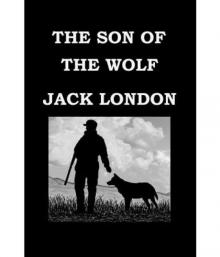 The Son of the Wolf
The Son of the Wolf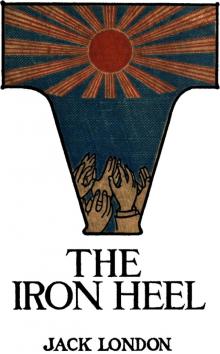 The Iron Heel
The Iron Heel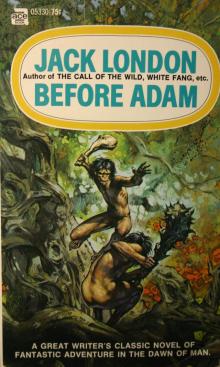 Before Adam
Before Adam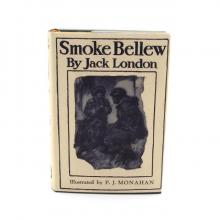 Smoke Bellew
Smoke Bellew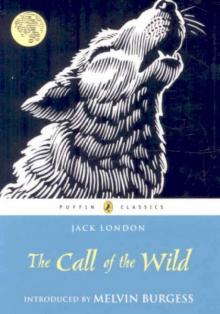 The Call of the Wild
The Call of the Wild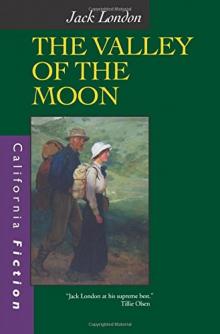 The Valley of the Moon Jack London
The Valley of the Moon Jack London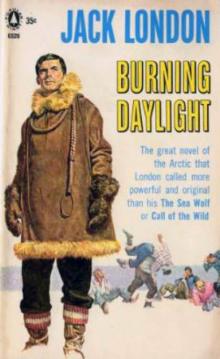 Burning Daylight
Burning Daylight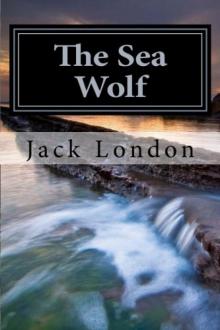 The Sea Wolf
The Sea Wolf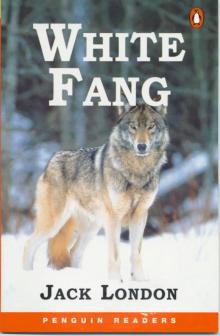 White Fang
White Fang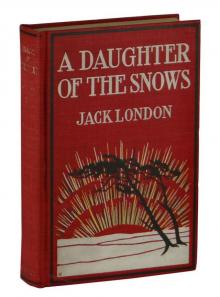 A Daughter of the Snows
A Daughter of the Snows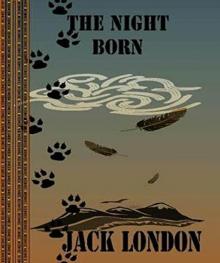 The Night-Born
The Night-Born A Son Of The Sun
A Son Of The Sun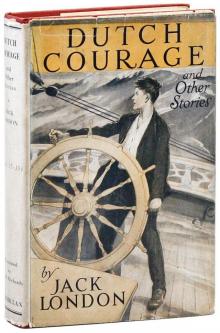 Dutch Courage and Other Stories
Dutch Courage and Other Stories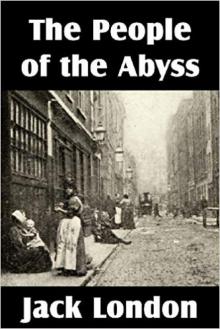 The People of the Abyss
The People of the Abyss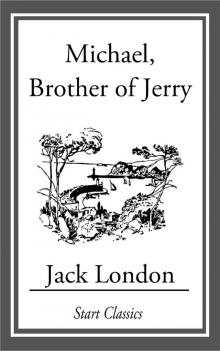 Michael, Brother of Jerry
Michael, Brother of Jerry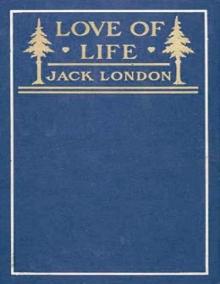 Love of Life, and Other Stories
Love of Life, and Other Stories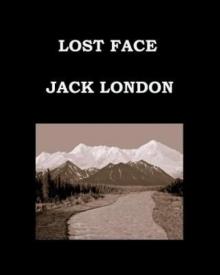 Lost Face
Lost Face The Road
The Road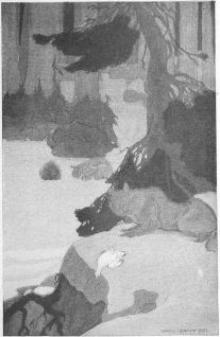 Love of Life
Love of Life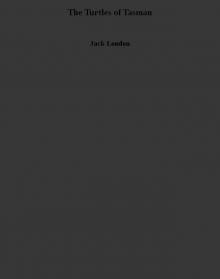 The Turtles of Tasman
The Turtles of Tasman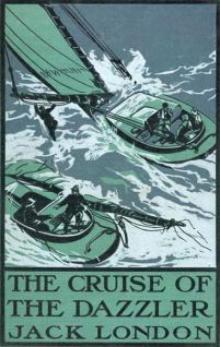 The Cruise of The Dazzler
The Cruise of The Dazzler The Heathen
The Heathen The Scab
The Scab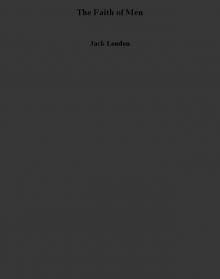 The Faith of Men
The Faith of Men Adventure
Adventure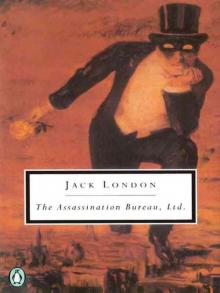 The Assassination Bureau, Ltd.
The Assassination Bureau, Ltd.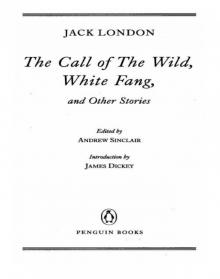 The Call of the Wild, White Fang, and Other Stories
The Call of the Wild, White Fang, and Other Stories The Call of the Wild and Selected Stories
The Call of the Wild and Selected Stories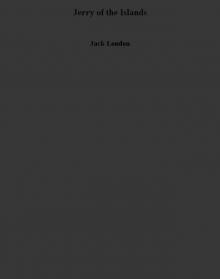 Jerry of the Islands
Jerry of the Islands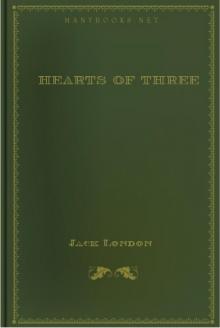 Hearts of Three
Hearts of Three The House of Pride
The House of Pride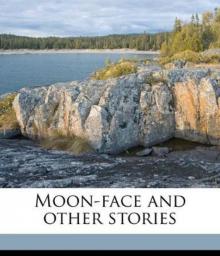 Moon-Face and Other Stories
Moon-Face and Other Stories Children of the Frost
Children of the Frost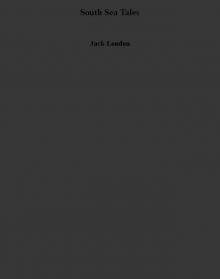 South Sea Tales
South Sea Tales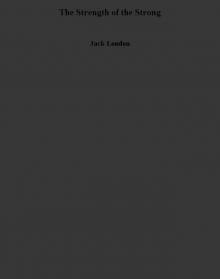 The Strength of the Strong
The Strength of the Strong The Jacket (The Star-Rover)
The Jacket (The Star-Rover) The Little Lady of the Big House
The Little Lady of the Big House John Barleycorn
John Barleycorn ADaugter of Snows
ADaugter of Snows The Mutiny of the Elsinore
The Mutiny of the Elsinore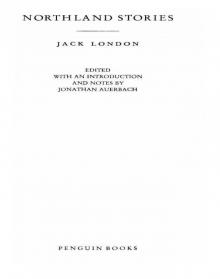 Northland Stories
Northland Stories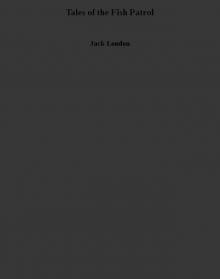 Tales of the Fish Patrol
Tales of the Fish Patrol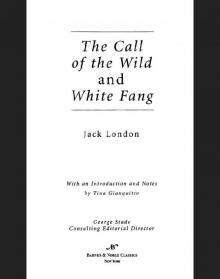 Call of the Wild and White Fang (Barnes & Noble Classics Series)
Call of the Wild and White Fang (Barnes & Noble Classics Series)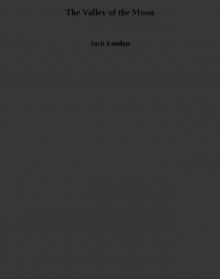 The Valley of the Moon
The Valley of the Moon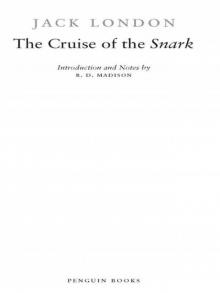 The Cruise of the Snark
The Cruise of the Snark The Game
The Game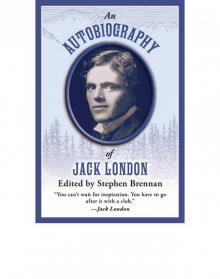 An Autobiography of Jack London
An Autobiography of Jack London